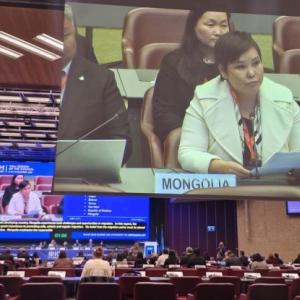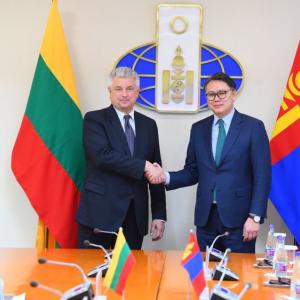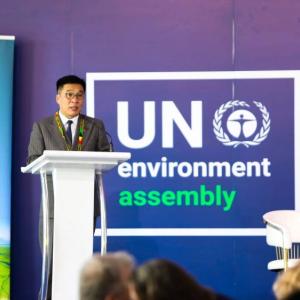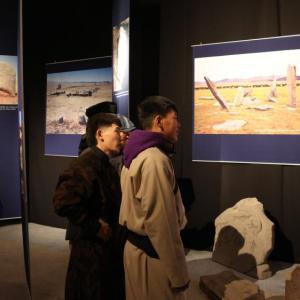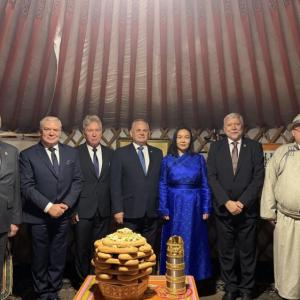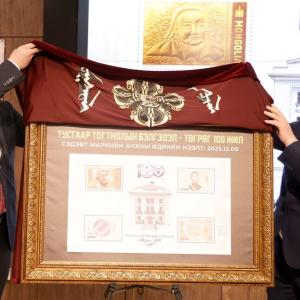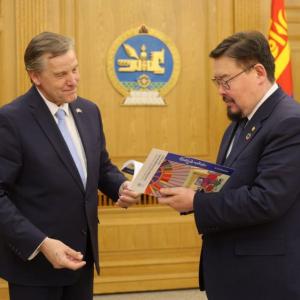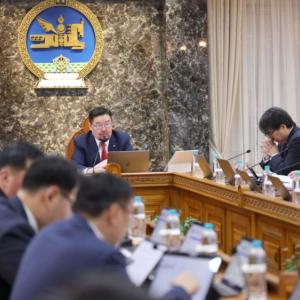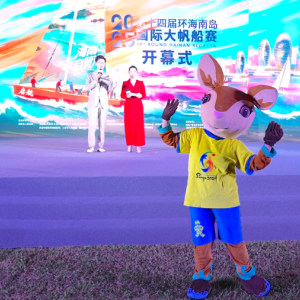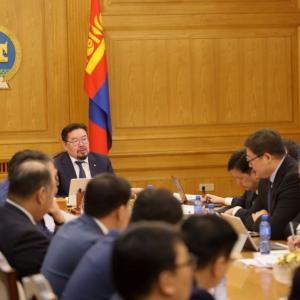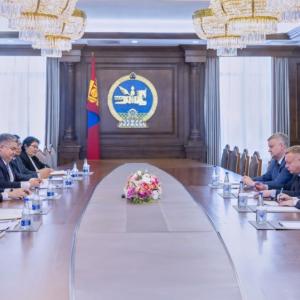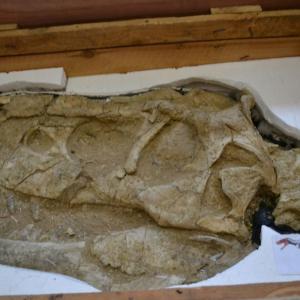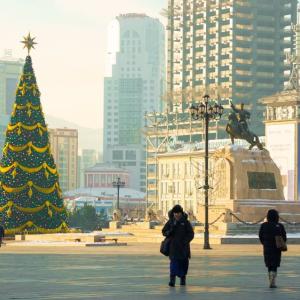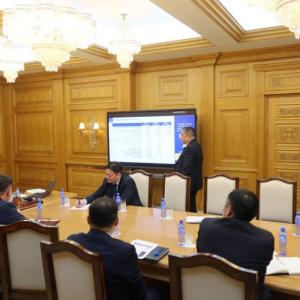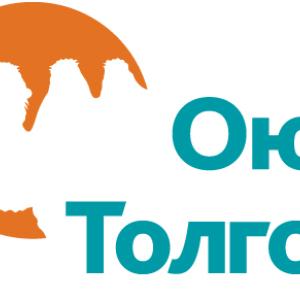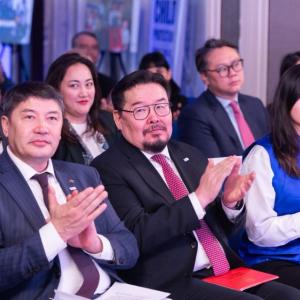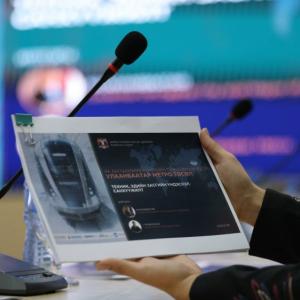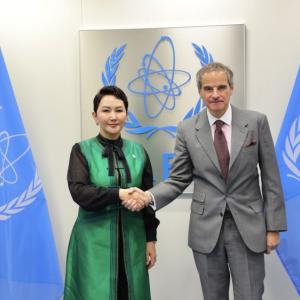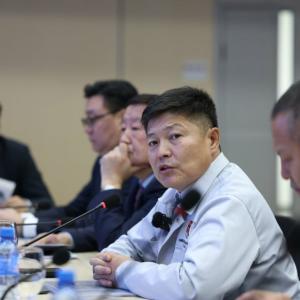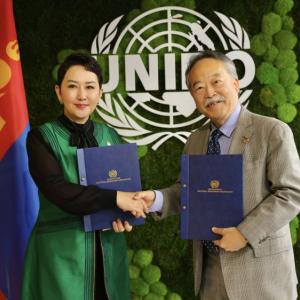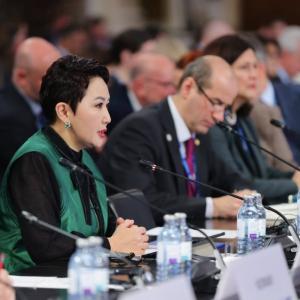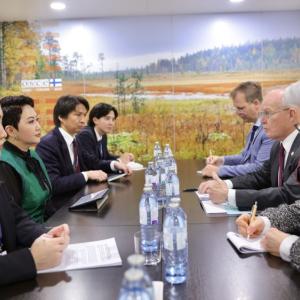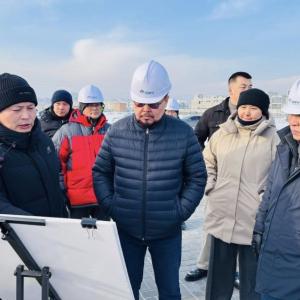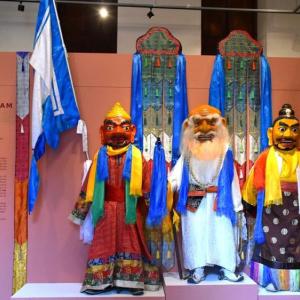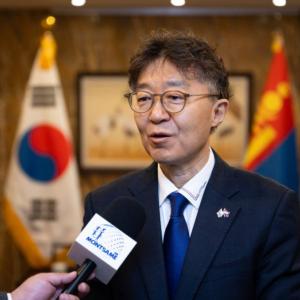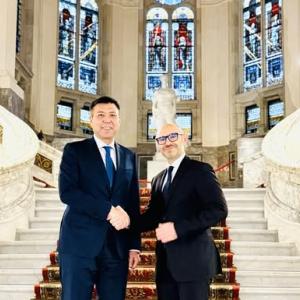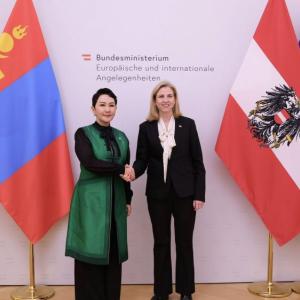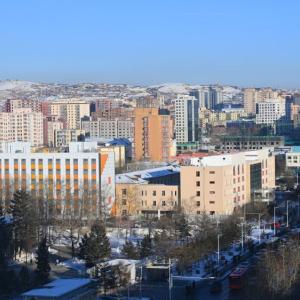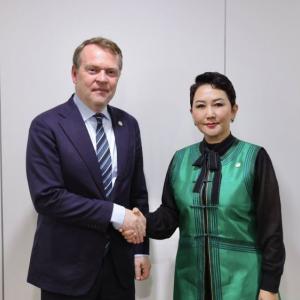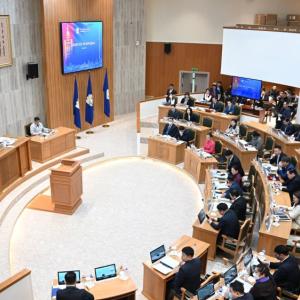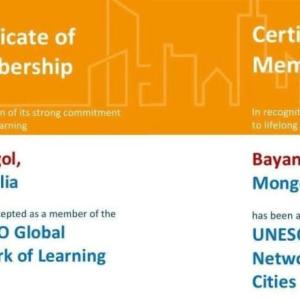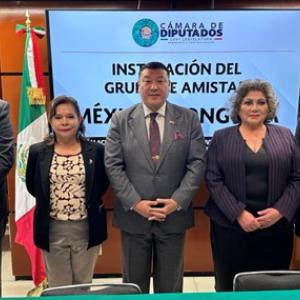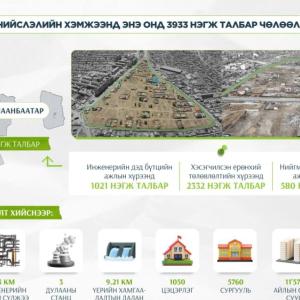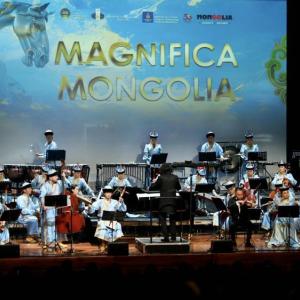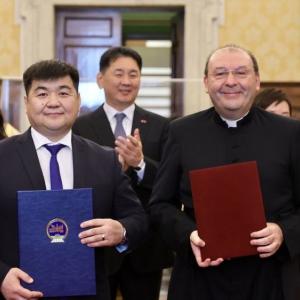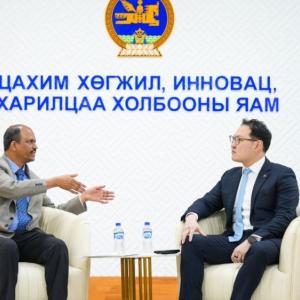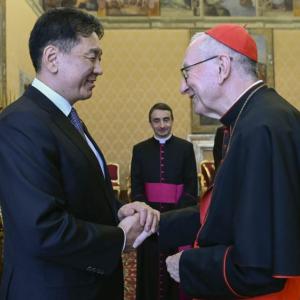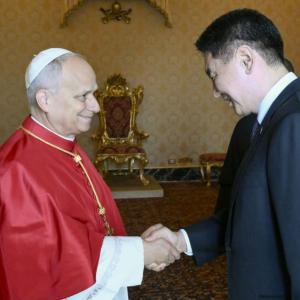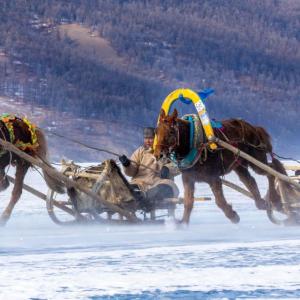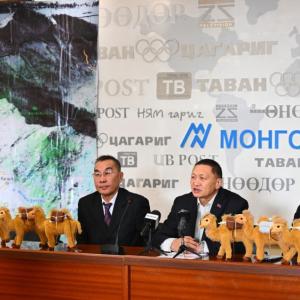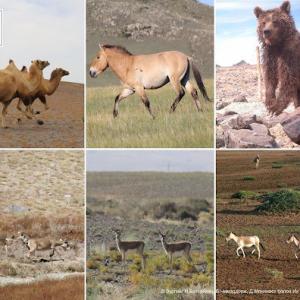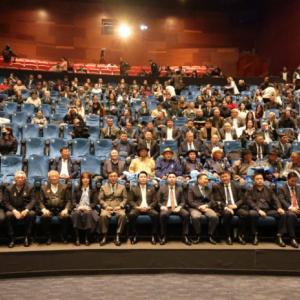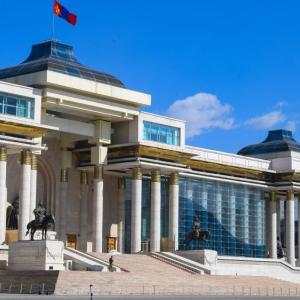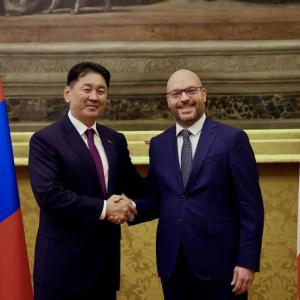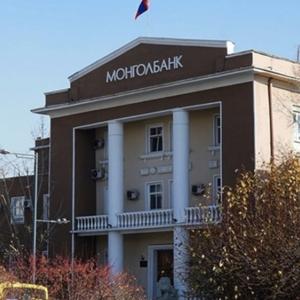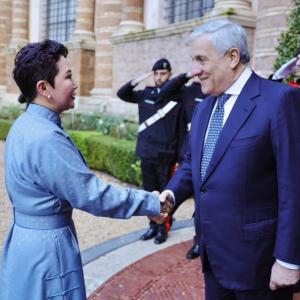President U.Khurelsukh: Mongolia should lead the world in Chinggis Khaan studies
Society
Address by President of Mongolia H.E. Ukhnaagiin Khurelsukh at the special session of the State Great Khural dedicated to the 860th Anniversary of the birth of the Great Chinggis Khaan.
“My fellow Mongolians – the guardians of hearth and home of the Great Mongolian State under the Eternal Blue Sky,
My fellow countrymen, living all over the world, from where the sun rises to where it sets,
Esteemed Speaker of the State Great Hural and Prime Minister,
Honorable state officials and friends,
Dear guests,
I wish to extend my greetings to you on the occasion of the 860th Anniversary of the birth of the Great Chinggis Khaan - the great leader in the history of the humankind, the founder of the modern world, the Man of the Millennium and the source of the lasting pride of the Mongolian people.
We, the Mongolians, are blessed people.
The Eternal Blue Sky bestowed upon us the Great Chinggis Khaan – the King of Kings of great genius.
Eight centuries ago the Great Chinggis Khaan was born as Temuujin, the eldest son of the Mongolian nobleman and warrior Yesukhei, and the wise queen Oelun at the chest of the sacred mountain Burkhan Khaldun, at the basin of the three rivers of eternal spring water.
Temuujin unified the scattered Mongolian tribes and established the Great Mongolian State, strengthened the golden tether of statehood dating back to the Hun dynasty, rekindled the hearth of the Mongolian state, and was exalted as the Great Chinggis Khaan recognized all over the world.
Chinggis Khaan is the guardian of the independence and the very being and existence of the Mongolian nation, the source of our people's pride, and the great emperor of today and forever.
Consolidating the traditions of statehood of our forefathers, inheriting the wisdom to govern the state and the people, winning the hearts of its people and honing their trust and confidence, aware of the past, sensible of the present and discerning about the future, this man was a genius who made invaluable contributions to the shaping of the history of the world.
The thirty years of struggle for unity, of quest for peace, of crafting the rule of law, and of eventually emerging as a Great Khaan of heavenly might from a humble young man wasn’t easy.
Abandoned by relatives and kinfolk, knowing the pain of loss at young age, Chinggis Khaan unified the scattered nomadic tribes and founded the Great Mongol State thanks to perseverance, courage, fortitude of mind, wisdom and the power of his will.
Chinggis Khaan’s founding of the Great Mongol State was an event of unprecedented and unparalleled nature in the world history where the peoples of the world enjoyed harmony and accord peacefully co-existing under the Eternal Blue Sky.
The Great Mongolian State, built by Chinggis Khan, marked two centuries in the history of humankind as “Mongolian centuries”.
The Great Mongolian State strengthened its unity, enhanced its statehood, promoted the rule of law, put an end to wars and conflicts across Asia and Europe, established peace in the world, and expanded into an empire that was admired by the world for its greatness.
Encyclopedia Britannica notes that the territory of the Mongol Empire accounted for 23 million square kilometers from the Pacific Ocean in the east to the Persian Gulf and the Danube River in the west, representing the largest land area in the history of the world.
Even today, the world continues to study with interest how the Mongols of Chinggis, numbered so few, with a nomadic civilization, were able for two centuries to keep the people unified and govern millions of people of different languages, cultures and religions, dispersed throughout a vast territory.
We, Mongols, take profound pride in the fact that the entire humankind, including the global leaders have constantly studied and learned from the genius, history, ideals and causes of the Supreme Khaan of the Mongols.
The first Prime Minister of India, Jawaharlal Nehru, praised Chinggis Khaan as "undoubtedly a military genius and leader, on par with Alexander of Macedonia and Julius Caesar in the history of the world”, and as "a man who valued peace, rather than war, despite his military superiority."
Indeed, the empire he established was unparalleled in military science, might and the art of warfare, yet, it had always sought and honored law, peace and harmony in ruling its huge empire of a multitude of nations.
In 1995, the Washington Post named Chinggis Khaan as the "Man of the Millennium", in recognition of the contributions Chinggis Khaan and his successors made eight centuries ago in overcoming political, economic, religious, and civilizational wars and conflicts and proclaiming the "Pax Mongolica".
The establishment of the "Pax Mongolica", enabled the people of Eurasia to focus more on creating, building, construing, developing and studying. Hence, many areas of science, culture and education were developed, including mathematics, medicine, philosophy, astronomy, history, geography, literature, music, visual arts and architecture. In addition, land and water maps were made, and new advanced methods and technologies of military warfare, animal husbandry, and agriculture were developed.
Also, the transportation and communication system of that time got a tremendous boost by connecting vast areas by Urtoo, the horse relay stations.
Chinggis Khaan and his successors developed the Silk Road and ensured its security, thus boosting trade and commerce to flourish in vast areas from the Korean Peninsula to the Mediterranean Sea, introduced paper money into circulation and made significant contributions to the development of world economy.
Historians and researchers view that the Great Mongol State was the political and economic center of the world at that time. The City of Kharkhorum stands out as a historical and cultural heritage to testify this assertion.
In 1220, Chinggis
Khaan issued a decree to establish the city of Kharkhorum and to move the
capital of the Great Mongol State.
Kharkhorum was the center of many religions and civilizations, where scholars, artists, artisans, merchants, and envoys of kings and nobles from many countries lived or sojourned on a visit.
Democratic ideals and values flourished under the patronage of the Mongol Empire.
When Eurasian countries came under the rule of the Mongol state in terms of land, politics, economy and social structure, the walls of civilization and ideology that divided countries and regions fell down, and it was for the first time that many peoples and nations experienced comfortable and peaceful co-existance with each other with mutual respect and understanding.
Although the Great Mongol State at that time was a monarchy with unlimited power, it embraced and upheld the principles of democracy.
A clear example of that was the city of Kharkhorum, the capital city, where 12 temples, churches and mosques of various religions, including Buddhist, Christian and Muslim, coexisted and freely functioned, and representatives of various religions met and debated. That occurred for the first time in world history.
This was made possible due to the fact that the diversity of worldviews, beliefs, and religions of various peoples of that time was not banned or infringed upon, but rather their values were treated with respect, which was preserved in the history of humankind and passed down as one of fundamental principles of the modern civilization.
My fellow Mongolians,
Since the Great Chinggis Khan was a man of the world who founded the Eurasian Empire, his biographies have been written and printed in many languages in various countries since the 13th century.
Therefore, leaders of many countries, renowned scholars and religious leaders recognize that the history of Chinggis Khan is not only the history of Mongols, but also the history of the world.
In the famous book entitled "Genghis Khan and the Making of the Modern World" written in 2004, Jack Weatherford, renowned American scholar, emphasized that "Genghis Khan is the great king who laid the groundwork of the ideals and foundation of the modern world."
This famous work attracted the world's attention and re-acquainted humanity with the great story of Genghis Khan, and was selected as a bestseller of the New York Times.
Also, Jack Weatherford wrote, "P. Carpini and V. Rubruk, who visited Mongolia in the 13th century, applauded how the laws, enforced by Chinggis Khaan, were adhered to, and they wrote on a number of occasions how Mongolians respected and followed the laws established by Emperor Chinggis Khan."
J. Chaucer, an English writer of the 14th century, called Chinggis Khaan the "Great King" of the law. According to him, Chinggis Khaan was a leader who was loyal to the law he had sworn to. He wrote that the most extraordinary thing was the fact that powerful kings of that time put themselves above the law, whereas Chinggis Khaan obeyed the law equally.
Paul Pelliot, a French scientist and a well-known Orientalist, concluded the period of Chinggis Khaan's conquest as "the unprecedented great miracle."
Furthermore, on the 800th anniversary of founding the Great Mongolian State, the President of the Republic of Korea and Nobel Peace Prize Laureate Kim Dae-jung wrote: "Chinggis Khaan's achievements have the following historical significance: First, he created land and sea routes connecting East and West. Second, he had played an important role in the spread of Christianity and Islamic religion to the East. Third, he influenced the spread of geography, astronomy, mathematics, and mapping technology to the West. Fourth, by intensifying the cultural and economic exchange between East and West, he changed the future development course of the world".
The XIV
Dalai Lama underscored that “The renowned Great Mongol Empire was founded in
1206 after the various Mongolian tribes gathered together and proclaimed
Chinggis Khaan their leader. What he went on to achieve, he did through a
determined exercise of courage and physical strength. Today, it is fitting to
remember with pride what he accomplished for Mongolian independence, unity and
freedom. Taking inspiration from his example, I urge you to apply a similar
determination in extending education in your country, in furthering not only
material progress, but also in fostering the important values of inner
development.”
Pope Benedict XVI wrote in 2006, "Through his personality Chinggis Khaan made a marvelous contribution to the recognition by the world of the political, social and cultural specificities of the Mongolian people. From 1206 to the present, there have been significant changes in human development, yet it is beyond doubt that Chinggis Khaan's contribution to the Great Mongolian State and its relations with other civilizations will remain significant. It is critical not only to study this important achievement, but also to duly mingle the rightful national pride as a model in relations with civilizations of other peoples”.
The President of the Russian Federation, Vladimir Putin, stressed that, "The Mongolian State, founded by Chinggis Khaan, had a great impact on the course of the world history."
Japanese Prime Minister Junichiro Koizumi cited the conclusion of scholar Okada Hidehiro to the effect that "During the time of the Mongol Empire, which ruled the lands of Eurasia, a general concept of the “world” had originated leading to the creation of the world history," and further stressed that "Also, considering Chinggis Khaan's policies such as appointing talented and learned foreigners to high positions, introducing a common currency, and exercising freedom of religion, the Mongolian Empire was a pioneer of globalization. Junichiro Koizumi further concluded that “even from a historical viewpoint, the reality of Chinggis Khaan, who started a new era in history, would reveal much more about the world at that time”.
Hosni Mubarak, President of the Arab Republic of Egypt, mentioned that “The historical role of this great leader was not confined only to the unification of Mongol tribes and the establishment of the Great Mongol State, he had a profound influence on the change of the world map to be redrawn during the late Middle Ages.
Moreover, historians unanimously agree that Chinggis Khaan was a great political thinker, brilliant military leader, and possessed strong leadership skills, which are all reflected in the advanced civil and military systems he established during his rule as well as the law and order that continued long after him.
Chinggis Khan was able to establish the Mongol Empire, one of the greatest empires in history, within a few years. As his fame spread throughout the world, historians have included his name in the list of the world’s greatest leaders along with Ramses II, Thutmose III, Alexander the Great and Caesar. His empire stretched from the Pacific Ocean to the Black Sea and from Siberia to the northern border of Southeast Asia.
Despite the prevailing perception of Chinggis Khaan and his successors as great leaders in Egypt and the region, in some parts of Islamic world, he is remembered as a usurper who overthrew the Khwarazmian Empire and captured Khwarasm, Samarkand, and Bukhara, as well as occupied Khorasan, Afghanistan, Iran, Iraq, and Al Mashreq.
Nevertheless, it is more appropriate to assess such a leader not by the prevailing criteria of today, but of that time. By the criteria of his time, Chinggis Khaan was renowned as a great leader and conqueror.
He unified his nation, transforming a few scattered tribes into a powerful state and then a great empire on vast territories. Even after his death, his successors continued to expand the empire. Their military forces crossed the Danube River and reached the borders of present-day Germany.”
Recep Erdoğan, President of the Republic of Turkey, “The Mongol Empire founded in 1206 was the largest contiguous land empire that the world has known, a well-established fact that will no doubt continue to feature prominently in the annals of the history of mankind. The great Chinggis Khaan went into history not only as the leader that founded this vast Empire, but also as the greatest military mastermind of all time that extended the territories of that State to infinite greatness.
In 1206 Chinggis Khaan gained the stature of the founder and the sovereign of a worldwide empire, thus leaving behind the era of tribal chieftainship.
Chinggis Khaan left a vast State stretching from the Black Sea to the Pacific Ocean as legacy when he died in 1227.
The Mongol Empire thus owed a lot to its founder, the great Chinggis Khan, who made inroads in histories of many nations, be it a friend or foe, with his reputation of being a great commander who could project force to wherever he pleased.
Modern Mongolia is destined to prosper as an active member of the contemporary world, given its vast territory of more than 1.5 million sq. km., its young and dynamic population, and its rapidly evolving reform process launched in 1990s.
Mongolia has managed to preserve its distinctive place in world history and world cultural heritage.”
Bill Clinton, Former President of the United States, also noted that “Since the unification of the Mongol State by Chinggis Khaan in 1206, Mongolians have always deeply cherished their independence and freedom.”
Jacques Chirac, President of France, describing Chinggis Khaan and his deeds, said, “I have not yet fully explored and learned about the great conqueror, who shook the world, a highly cultured visionary and a shaper of his society.”
Chinggis Khaan dismantled the tribal system, created national unity, and laid the foundations of the Mongolian nation that will last for generations.
He established peace, ensured the security of the Silk Road, and provided an opportunity to develop trade as well as intellectual and cultural exchanges.
According to historians, one of Chinggis Khaan's important legacies, the Pax Mongolica, allowed relations between Europe and Asia to flourish for centuries.
It was concluded that “Chinggis Khaan has become a modern legendary hero, and his power and legacy continue to be immortalized in a combination of fear and admiration from generation to generation.”
In 2005, on the occasion of the 800th anniversary of the establishment of the Great Mongol Empire, the General Assembly of the United Nations adopted a resolution urging its member countries to celebrate the contribution of Mongolians to the history of mankind.
In this resolution, the General Assembly recognized that “The Great Mongol State influenced, inter alia, societies across Asia and Europe and, in turn, absorbed influences from both East and West in a true interchange of human values; played important role in the development of extensive trade networks and the creation of large administrative, cultural, religious and commercial centers; and promoted dialogue and interaction among all forms of civilization.” It also emphasized “the ever-increasing significance and relevance of a culture of living in harmony with nature, which is inherent in nomadic civilization, in today’s world.”
It is evident from the speeches, researches and literature written by these well-known individuals that Chinggis Khaan and his successors deeply valued peace, ensured harmony under the rule of law, spread democratic ideals that fostered religion and equality, promoted development in many fields, including trade, communications, culture and science, and created the initial concept of diplomatic service and exchange of envoys. They laid the foundation for the values and ideals that we uphold today and have planted the root for modern-day globalization.
The Great Chinggis Khaan always kept the history and legacy of his ancestors in his heart, when he led his country. He was a visionary emperor and a father who shared his wisdom with his children and people.
Penelope Aubin, a famous English writer and interpreter of the 18th century, translated a book about Chinggis Khaan and presented it to the Prince of Wales, where she described Chinggis Khaan “not only as a pious, just and humble king, but also a wonderful husband, a good father, a loyal friend, a kind lord, and a wise general”.
He was a great man and emperor who treated his fellow people like his own children, respected the soldiers and scholars as brothers, and provided shelters to orphans and the poor. He was generous and distributed his wealth, placed his people, the state, and mothers above all, and deeply valued honesty.
The Great Chinggis Khaan taught us not to entrust state affairs to anyone who does not admit what he said, a shameless person who can't control himself, let alone others, and a sly, cruel, dishonest person with greed for wealth and power.
These teachings should continue to be the basic principle and practice of public service.
Honorable citizens, descendants of our Great Emperor,
The Great Khaan ignited our national pride, that has the ability to unite all the hearts that beat for Mongolia, with his power and glory.
The admirable merits and proud deeds of the emperor in the history of Mongolia is immeasurable, and it is a value that strengthens the intellectual immunity of the Mongolian people and unites the Mongolian nation.
We, Mongolians, are aware of our responsible and sacred duty in guarding the birthplace of our Great Chinggis Khaan and the hearth of all Mongolians around the world, and shall remember and pass on to the future generations that we must spare no effort in preserving, studying, researching and spreading the great heritage of our Great Khaan.
Therefore, the President of Mongolia issued a decree, urging every Mongolian to be aware that they are the guardians of the Great Mongol Empire’s hearth and home, and for Mongolian government, every household and organizations to honor the Chinggis Khaan’s portrait, to honor and follow Chinggis Khan’s teachings, deeds, and wisdom, to pass on the state's values and heritage to his successors, to maintain harmony, and to contribute to the prosperity of the country.
Chinggis Khaan
accomplished more than thousands of leaders could ever accomplish in a lifetime
and he left behind a vast and rich heritage for mankind.
It is a
pleasure to note and celebrate on this historic day, today, the strides and
achievements made by the government, heads of state, presidents, scholars,
citizens, and relevant organizations in terms of promoting, disseminating, and
reporting on the legacy and deeds of Great Chinggis Khaan abroad and
domestically.
This year,
on the occasion of the 860th anniversary of the birth of our Great Khaan, we,
Mongolians, have successfully built and opened the Chinggis Khaan Museum &
Cultural Center, which showcases history of Great Chinggis Khaan, his ancestors
and successors, despite the difficult times of the pandemic.
Also, the international scientific conference entitled “The World of Chinggis Khaan and Mongolian Studies” was organized in Ulaanbaatar and the International Association of Chinggis Khaan Studies was established this year.
This international association and the Chinggis Khaan museum aim to scientifically study, disseminate and publicize the great Khaan’s contribution to the development of humanity, his state ethics, historical and cultural heritage, expand the scope of Chinggis Khaan studies, activate the cooperation of scientists from many countries of the world and implement joint projects and programs.
Mongolia should lead the world in Chinggis Khaan studies.
World renowned individuals, intellectuals, scholars, and writers have spent several centuries learning and studying all the great deeds and accomplishments achieved by the Great Khaan since his birth.
Therefore, it is important to train and prepare specialized research scholars who will work on the study of Chinggis Khaan and the Mongol Empire at the international level through government policy.
As Chinggis Khaan studies develop, scholars and scribes of many countries will recognize, appreciate and acknowledge the great contribution of the Great Khaan to the development of mankind and the history of the world, and the true story about the Emperor and the Mongols will spread to the world.
The more we aspire to build a strong and developed country, the more we should strive to learn from our history, the knowledge and wisdom of our ancestors, and strengthen the golden bond of the past, present, and future.
The future
generations of Mongolia should never forget that our independent country,
freedom, vast territory, people, pride, history and culture are inextricably
linked with the glory of the Great Khaan, honor and follow the teachings of our
Emperor.
The Great Chinggis Khaan was able to establish the Great Mongol Empire and brought world peace. He made history by following his teachings to “Aim for the high mountains, cross the wide ocean, do not despair because it is far, you will reach it, do not get discouraged because it is big, you can cross it, do not be scared because it is heavy, you can lift it.”
Today, Mongolians can author great deeds and build a strong nation, if we cherish and strictly follow this wisdom of our Supreme Khaan, work hard for our country and become the masters of our destiny.
I encourage every Mongolian to respect and worship our great Khaan, to protect, from the bottom of our hearts, our freedom, independence and unity – the apple of our eyes, and remember every morning, strive every day, and contemplate every night that we are the continuation of the Great Khaan's great legacy.
On behalf of the people of Mongolia, the descendants of the Great Khaan, we would like to extend our greetings to the world on the anniversary of the birth of Chinggis Khaan, the Man of the Millennium, one of the founders of modern world, and the King of Kings.
May the
power and glory of the Great Emperor bless us, Mongolians, forever under the
power of the eternal sky!”
 Ulaanbaatar
Ulaanbaatar






